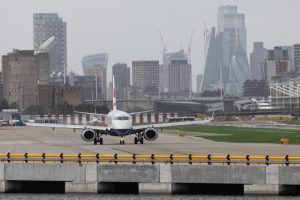Airport expansions have been firmly on the back burner in recent years, with climate considerations and the pandemic-driven fall in passenger numbers creating rising uncertainty.
However projects including capacity increases at London City, Manston and Southampton airports have moved forward in the past year - so could 2023 see expansion plans back on the agenda?
According to New Economics Foundation senior researcher Alex Chapman, "we can expect to see airports continuing to push hard for permission to expand over the next year or two".
However Chapman said that "the reality is that aviation does not have an adequate short-to-medium-term solution to its colossal climate impact" and "it is only a matter of time before a more responsible government takes action to curtail the growth in flight departures which is doing such damage to our planet".
He added: "Airports will hope to secure an agreement for growth now, while government policy is lax, in the hope that they can protect that position in future. This approach is reckless and irresponsible on behalf of both business and government, but is what we have come to expect in a country which is approving new coal mines and more oil and gas exploration while climate breakdown unfolds around us."
In July, London City Airport returned to expansion plans which were put on ice in 2020 due to the impact of Covid-19. The airport launched a 10-week public consultation on plans to increase annual passenger numbers from 6.5M to 9M. This week, the airport submitted its revised planning application to the borough of Newham.
The Planning Inspectorate had previously concluded that "the Applicant had failed to demonstrate sufficient need for the Proposed Development, additional to (or different from) the need which is met by the provision of existing airports", and highlighted climate change, harm to heritage assets, noise, operational issues and impacts on local road network as other concerns.
Despite this the project has been given the green light, paving the way for the airport to reopen. RiverOak Strategic Partners’ (RSP) planning application is specifically for the upgrade and reopening of the airport primarily as a freight airport, with some passenger services, with a capacity of at least 12,000 air cargo movements per year.
Construction of Southampton Airport’s runway extension can also get underway after The Court of Appeal upheld Eastleigh Borough Council's decision to approve the plans. It marks the end of the legal battle, with The Court of Appeal the final route available to campaigners trying to stop the expansion.
The scheme involves a 164m runway extension, an associated blast screen and the reconfiguration and enlargement of the existing long stay car park to add 600 spaces. The Airport claims it is “absolutely critical to [its] viability as a regional airport” as the current length is not suitable for modern airline fleets.
However, many see the decision making process for airport expansions as flawed and based on outdated policies.
Aviation Environment Federation director Tim Johnson has previously criticised the reliance on the Airports National Policy Statement (ANPS) and Making Best Use (MBU) "because both documents were issued prior to net zero legislation coming into effect". Meanwhile, Johnson has said that the government's Jet Zero strategy, which supports “justified” airport expansions while working to make the UK’s aviation sector net zero by 2050, "isn't aligned with the Committee on Climate Change's advice and has been criticised by NGOs for being a high risk strategy that relies on unproven technologies".
Going forward, Johnson feels that "there are many reasons why airport expansion in the UK faces an uncertain future".
He explained: "The proposals taken forward in 2022 were already at an advanced stage, but investors in new applications will still be worried that passenger numbers remain below their 2019 peak.
"There is also policy uncertainty, with the Good Law Project requesting the government to review the ANPS, which came into effect before net zero climate 2050 legislation, and the fact that there's little time for the application processes to be completed and determined this side of the next general election.
"In the meantime, the government's climate advisers, the Climate Change Committee, continue to argue that there should be no net increase in airport capacity if the UK is to stay on track to meet its climate targets."
However, not all expansion plans have progressed in the past year. Plans to expand Heathrow to include a third runway, for example, still remain on ice after being paused during the start of the Covid-19 pandemic.
Like what you've read? To receive New Civil Engineer's daily and weekly newsletters click here.
 New Civil Engineer Civil engineering and construction news and jobs from New Civil Engineer
New Civil Engineer Civil engineering and construction news and jobs from New Civil Engineer




Have your say
or a new account to join the discussion.